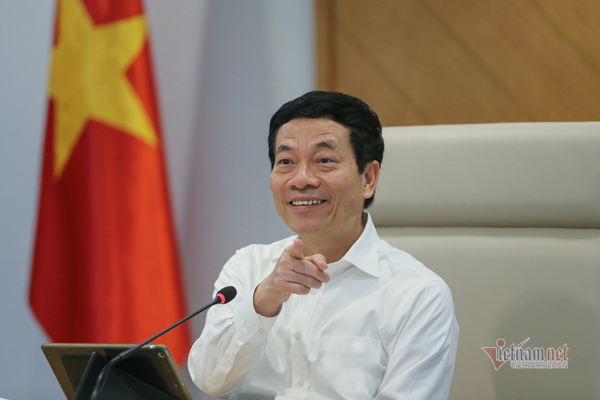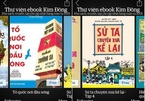 |
|
Minister of Information and Communications Nguyen Manh Hung. Photo: Le Anh Dung
|
Minister Nguyen Manh Hung recently met with top officials of the Department of Publishing, Printing and Distribution and publishing houses in Vietnam to discuss the industry’s development strategy for the 2021-2025 period. VietNamNet would like to introduce his speech presented at the event.
People read fewer books than before, but the reading time has not fallen but has increased. But the time to read news and share information on the Internet has increased sharply. Thus, they spend less time on books. This is quite similar to the story of the press when social networks appeared. If the way of reading is different, the way of making books must be different, too.
In the past, we had very few books, so the main thing was to have books to read. Now there are so many books, the main thing is to filter and find the right books to read. Each of the billions of people on the planet have a need to find the right books to solve their needs and problems. So what will our publishing industry do?
In the past we had fewer problems, fewer concerns and, therefore, more time for books. We now have too many concerns, but the time is still 24 hours a day so the time spent on each issue is less. The time spent on books is also less. So should books have hundreds or thousands of pages? And if they must be that long, should there be shorter versions or search engines to help readers quickly grasp the main idea of books and then read them more carefully when they have time?
A book is read by many readers, who read it by different means (and the mobile phone is increasingly predominant), so should there be different versions of the same book for different audiences? For different reading tools? Without technology, without digital environment, without e-books, this would not be easy and very expensive. But if it's easy and cheap, should we do it?
Previously, each year there were a few new books were published, and therefore there were books that millions of people read and became the common awareness of the whole society and thus formed the strength of the nation. Now each year there are nearly 40,000 titles. Each book is only printed with several thousand copies, and therefore no book has millions of readers, no book becomes the society’s common perception, no book can form national strength. So is there any way to have books that reach millions of people as before?
Previously, it was difficult to bring books to people in remote areas and books were also very expensive for farmers. Now with the help of digital technology, is this problem easier to solve? Solving this problem would be a huge step forward. So the new era not only poses new problems for us but also creates new opportunities, solves millennium problems. It's also about the way we look at it. Are e-books the solution, when 44% of the world's population read book online?
Before, there were not many publishers as we have today, but there are many good books and many people read them. Should we have fewer publishers? If we have fewer publishers, can we meet the diverse and personalized needs of the people? So what is the correct answer? Or should we have many publishers, with some key ones?
Are these problems of the Vietnamese publishing industry only or the problems of the world? If it's global issues, what are the world experiences? Have we inquired and learned from them yet? The world changes so fast so that no one is the best. But the person who knows who is best at what and learns from them may be the best. Should the publishing industry pursue this approach?
In the past, there was only one way to read books. Now people have so many ways to read. They read newspapers, magazines, online news sites and social networks. Instead of reading, they can hear audiobooks or news read by robots… With so many ways of reading like this, should books have new transformations suitable for the times?
The goal and mission of books is still to store, accumulate and spread knowledge, which must be preserved. But the method requires changes. Books are an open and evolving concept. But how books are made and distributed depends on the living environment and the development of science and technology. I believe that these innovations will help the publishing sector better fulfill its mission.
The biggest change in human history is probably the move from the real world to the digital world. Everything real will have a digital version. There will be things that are available in the digital environment that are not available in the real world. In that digital environment, everything will have a new life, a new way of relationship, and new values will be created in a new way. We call this digital transformation. So how is digital transformation in the publishing industry? The problems and questions raised above are all related to digital transformation.
Books are knowledge. Whenever books are preserved, then humankind is there.
Minister of Information and Communications Nguyen Manh Hung

How technology changes traditional books
Human knowledge has been digitized for cyberspace in the Internet era.

How can books change us?
The “How Worthwhile Is Your Youth” program contributes to changing the minds of many young people.